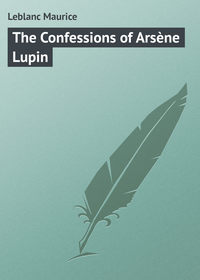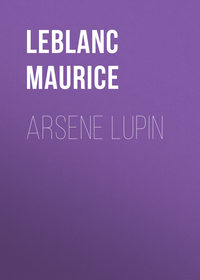
The Frontier
"You, M. Morestal!" said Captain Daspry.
Pointing to the frontier, the old man asked:
"Are they there?"
"Yes."
"Are you making a resistance?"
"Yes."
"Are there many of them?"
"There are twenty to one."
"If so …?"
"We've got to."
"But …"
"We've got to, M. Morestal; and be easy, we shall stand our ground… I'm certain of it."
Morestal said, in a low voice:
"Remember what I told you, captain… The road is undermined at two hundred yards from the terrace… A match and …"
"Oh," protested the officer, "I hope it won't come to that! I am expecting relief."
"Very well!" said Morestal. "But anything rather than let them come up to the Old Mill!"
"They won't come up. It's out of the question that they should come up before the arrival of the French troops."
"Good! As long as the Old Mill remains in our hands, they won't be able to man the heights and threaten Saint-Élophe."
They could plainly see columns of infantry winding along the Col du Diable. There, they divided and one part of the men turned towards the Butte-aux-Loups, while the others – consisting of the greater number, for this was evidently the enemy's object – went down towards the Étang-des Moines, to seize the high-road.
These disappeared for a moment, hidden by the bend of the ground.
The captain said to Morestal:
"Once the road is held and the assault begins, it will be impossible to get away… It would be better, therefore, for the ladies … and for you yourself …"
Morestal gave him such a look that the officer did not insist:
"Come, come," he said, smiling, "don't be angry… Rather help me to make these good people understand…"
He turned to the servants, to Victor, who was taking down a rifle, to the gardener, to Henriot, and warned them that none but combatants must stay at the Old Mill, as any man captured with arms in his hands exposed himself to reprisals.
They let him talk; and Victor, without thinking of retiring, answered:
"That's as may be, captain. But it's one of the things one doesn't think about. I'm staying."
"And you, Farmer Saboureux? You're running a big risk, if they prove that you set fire to your farm."
"I'm staying," growled the peasant, laconically.
"And you, tramp?"
Old Poussière had not finished eating the piece of bread which he had taken from his wallet. He was listening and observing, with eyes wide open and an evident effort to attend. He examined the captain, his uniform, the braid upon his sleeve, seemed to reflect on mysterious things, stood up and seized a rifle.
"That's right, Poussière," grinned Morestal. "You know your country right enough, once it needs defending."
A man had made the same movement as the tramp, almost at the same time. One more division in the gun-rack was empty.
It was Duvauchel, still rather unsteady on his pins, but wearing an undaunted look.
"What, Duvauchel!" asked Captain Daspry. "Aren't we deserting?"
"You're getting at me, captain! Let the beggars clear out of France first! I'll desert afterwards."
"But you've only one arm that's any good."
"A greaser's arm, captain … and a French greaser's at that … is worth two, any day."
"Pass me one of them rifles," said the gardener's son. "I know my way about with 'em."
Duvauchel began to laugh:
"You too, sonnie? You want one? You'll see, the babes at the breast will be rising up next, like the others. Lord, but it makes my blood boil to think that they're in France!"
All followed the captain, who allotted them a post along the parapet. The women busied themselves in placing ammunition within reach of the marksmen.
Marthe was left alone with her husband. She saw that the scene had stirred him. In the way in which those decent folk realized their duty and performed it without being compelled to, simply and spontaneously, there was that sort of greatness which touches a man to the very depths of his soul.
She said to him:
"Well, Philippe?"
His face was drawn; he did not reply.
She continued:
"Well, go… What are you waiting for? No one will notice your flight… Be quick… Take the opportunity while it's here…"
They heard the captain addressing his lieutenant:
"Keep down your head, Fabrègues, can't you? They'll see you, if you're not careful…"
Marthe seized Philippe's arm and, bending towards him:
"Now confess that you can't go … that all this upsets your notions … and that your duty is here … that you feel it."
"There they are! There they are!" said a voice.
"Yes," said Captain Daspry, searching the road through the orifice of a loop-hole, "yes, there they are!.. At six hundred yards, at most … It's the vanguard… They are skirting the pool and they haven't a notion that …"
A sergeant came to tell him that the enemy had hoisted a gun on the slope of the pass. The officer was alarmed, but old Morestal began to laugh:
"Let them bring up as many guns as they please!.. They can only take up positions which we command and which I have noted. A few good marksmen are enough to keep them from placing a battery."
And, turning to his son, he said to him, quite naturally, as though nothing had ever parted them:
"Are you coming, Philippe? We'll demolish them between us."
Captain Daspry interfered:
"Don't fire! We are not discovered yet. Wait till I give the order… There'll be time enough later…"
Old Morestal had moved away.
Philippe walked resolutely towards the gate that led to the garden, to the open country. But he had not taken ten steps, when he stopped. He seemed to be vaguely suffering; and Marthe, who had not left his side, Marthe, anxious, full of mingled hope and apprehension, watched every phase of the tragic struggle:
"All the past is calling on you, Philippe; all the love for France that the past has bequeathed to you. Listen to its voice."
And, replying to every possible objection:
"Yes, I know, your intelligence rebels against it. But is one's intelligence everything?.. Obey your instinct, Philippe… It's your instinct that is right."
"No, no," he stammered, "one's instinct is never right…"
"It is right. But for that, you would be far away by now. But you can't go. Your whole being refuses to go. Your legs have not the strength for flight."
The Col du Diable was pouring forth troops and more troops, whose swarming masses showed along the slope. Others must be coming by the Albern Road; and, on every side, along every path and through every gap, the men of Germany were invading the soil of France.
The vanguard reached the high-road, at the end of the Étang-des-Moines.
There was a dull roll of the drum; and, suddenly, in the near silence, a hoarse voice barked out a German word of command.
Philippe started as though he had been struck.
And Marthe clung to him, pitilessly:
"Do you hear, Philippe? Do you understand? The German speech on French soil! Their language forced upon us!"
"Oh, no!" he said. "That can't be… That will never be!"
"Why should it never be? Invasion comes first … and then conquest … and subjection…"
Near them, the captain ordered:
"Let no one stir!"
Bullets spluttered against the walls, while the sounds of firing reverberated. A window-pane was smashed on the floor above. And more bullets broke fragments of stone from the coping of the parapet. The enemy, surprised at the disappearance of the French troops, were feeling their way before passing below that house, whose gloomy aspect must needs strike them as suspicious.
"Ah!" said a soldier, spinning on his heels and falling on the threshold of the drawing-room, his face covered with blood.
The women ran to his assistance.
Philippe gazed haggard-eyed at that man who was about to die, at that man who belonged to the same race, who lived under the same sky as himself, who breathed the same air, ate the same bread and drank the same wine.
Marthe had taken down a rifle and handed it to Philippe. He grasped it with a sort of despair:
"Who would ever have told me …?" he stammered.
"I, Philippe … I was sure of you. We have not to do with theories, but with implacable facts. These are realities, to-day… The enemy is treading the bit of earth where you were born, where you played as a child. The enemy is forcing his way into France. Defend her, Philippe…"
He clenched his fists around his rifle and she saw that his eyes were full of tears.
He murmured, quivering with inward rebellion:
"Our sons will refuse … I shall teach them to refuse… What I cannot do, what I have not the courage to do they shall do."
"Perhaps, but what does the future matter!" she said, eagerly. "What does to-morrow's duty matter! Our duty, yours and mine, is the duty of to-day."
A voice whispered:
"They're coming near, captain… They're coming near…"
Another voice, beside Philippe, the voice of one of the women tending the wounded man, moaned:
"He's dead… Poor fellow!.. He's dead…"
The guns roared on the frontier.
"Are you coming, Philippe?" asked old Morestal.
"I'm coming, father," he said.
Very quickly, he walked out on the terrace and knelt beside his father, against the balusters. Marthe knelt down behind him and wept at the thought of what he must be suffering. Nevertheless, she did not doubt but that, notwithstanding his despair, he was acting in all conscience.
The captain said, clearly, and the order was repeated to the end of the garden:
"Fire as you please… Sight at three hundred yards…"
There were a few seconds of solemn waiting … then the terrible word:
"Fire!"
Yonder, along the barrel of his rifle, near an old oak in whose branches he once used to climb, Philippe saw a great lubber in uniform throw up his hands, bend his legs one after the other and stretch himself along the ground, slowly, as though to sleep…
THE END








